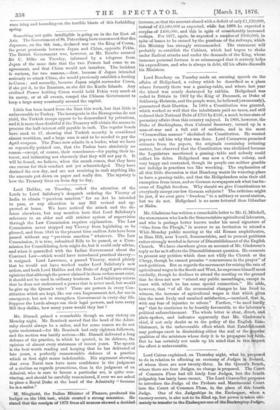Mr. Gladstone has written a remarkable letter to Mr. G.
Mitchell, the stonemason who leads the Somersetshire agricultural labourers, and who is perhaps better known under his usual signature of "One from the Plough," in answer to an invitation to attend a Whit-Monday public meeting at the old Roman amphitheatre, at Ham Hill, near "Yeovil, Somersetshire, and to present petitions rather strongly worded in favour of Disestablishment of the English Church. We have elsewhere given an account of Mr. Gladstone's reply safer as it affects the Disestablishment question. He consents to present any petition which does not vilify the Church or the Clergy, though he cannot promise "concurrence in the prayer" of such petitions. But as regards the movement for raising the rate of agricultural wages in the South and West, he expresses himself most cordially, though he declines to attend the meeting on the ground that he does not now "attend any public assemblages, except in cases with which he has some special connection." He adds, however, that "of all the economical changes he has lived to witness, the increase of agricultural wages is that which gives him the most lively and unmixed satisfaction,—unmixed, that is, with any fear of injustice to others." Further, "he need hardly say" that he continues to be heartily favourable to the labourer's political enfranchisement. The whole letter is clear, direct, and, plain-spoken, and indicates apparently that Mr. Gladstone's chief, if not only doubt as to the policy of the English Esta- blishment, is the unfavourable effect which that Establishment may perhaps exert in diminishing either the zeal or the topulax qualities of the ministers whose duty it is to propagate het faith. But he has certainly not made up his mind that in this rlas, pect the effect is unfavourable.


































 Previous page
Previous page